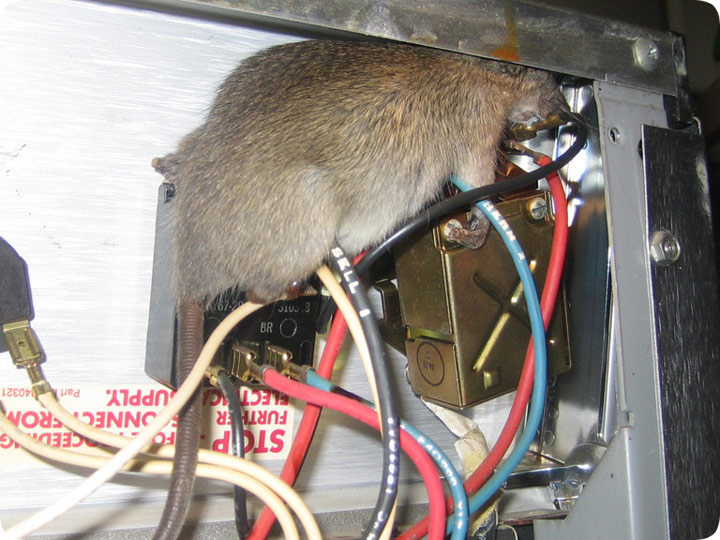-
info@aaanimalcontrol.com
Call us for help in your town
Humane Wildlife Education
Dead Rat in House - Died Chewing on Electrical Wires

09.13.2003 - I've encountered this scenario multiple times. There's a dead animal smell somewhere inside the house. I begin my search, sniffing the area. It's evident that the smell is the strongest in the kitchen. The homeowner knows this, and I can tell as well. However, what the homeowner doesn't suspect is that the dead animal is in fact in the oven. Not broiling in a pan for a Sunday dinner, but rotting in the rear panel with the electrical wiring.
The first time I was called for such a job, I was confused as well. I searched the attic, I sniffed all of the cabinets and cupboards, the walls, and everything. But the smell kept coming from the stove area. I pulled out the stove and the odor only increased in intensity. I then removed the rear panel, and voila, there you have it, a dead rat has chewed on the electrical wires, and somehow died. There it lies, to decompose and case a big odor. All I have to do is pry its little orange rodent teeth off the wires, and the job is done. Well, I make sure to put the panel back on and get the stove back in place and make sure it works and all of that.
At this home pictured above, the old lady went on and on about her deceased husband, and she showed me a photo of him from his army days. "Wasn't he handsome?" she asked. I said that he was, and I gave her a nice discount, since she was old and poor.
She gave me a plant as my reward. I planted it at my house. Good story, no? Anyway, if you've got a horrible smell in your kitchen, maybe it aint yo momma's cooking.
Do it yourself: Visit my How To Find and Get Rid of Dead Animals page for tips and advice.
Get professional help: Visit my Nationwide Pro Directory of wildlife removal experts.
For more wildlife stories, click my Wildlife Blog
or click my below banner to hire a local trapper.
Rodents, no matter what size, are always a nuisance. When these pests find their way into your property they can give root to a number of problems. Rodents carry with them parasites and pathogens which can cause health complications for you and your loved ones. Apart from crippling the health of a person they also dismantle and destroy the property. Rodents are responsible for tearing up the lawn and causing damage to the house by chewing on electrical wires and damaging the insulation. Rats, with the advantage of their size, can crawl into smaller places. Rats are responsible for inflicting heavy damage on the property both internally and externally.
Leaving the property damage aside they can also carry with them diseases that can affect a person's health. In some unfortunate cases, these rats come across electrical wires and chew on them. This results in an exposed copper wire which can conduct electricity and kill the rat. Living in a house that is at mercy of a rat infestation is certainly frustrating however dealing with a dead rat is even more concerning. The dead rat can be first identified by the stench that follows the rotting carcass. The dead rat's body starts to decompose after a while which gives out a horrible smell. When it comes to a dead rat, the removal of the carcass is not the solution, as the stench can attach itself to anything it comes in contact with. This stench can attract many other pests such as flies and many more. Therefore, it is suggested to remove the dead animal as fast as possible to decrease the discomfort. One can contact professionals to get the job done, as without the proper tools and knowledge, the process is highly dangerous.
After pinpointing the source of the smell the carcass can be identified and removed. One should also make sure to thoroughly clean and disinfect the whole surrounding area so that the smell dies away. After the successful removal of the carcass and disposing of it in a manner that it may no longer contaminate the environment, the wiring should be fixed so that any more power outrages are not experienced. After the careful completion of these tasks, the location from where the rat may have entered the building must be sighted. The sealing of all those openings must be made as quickly as possible to discourage any more future infestations or damage.




















